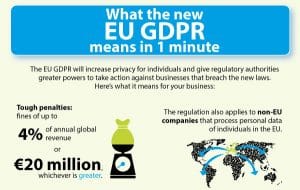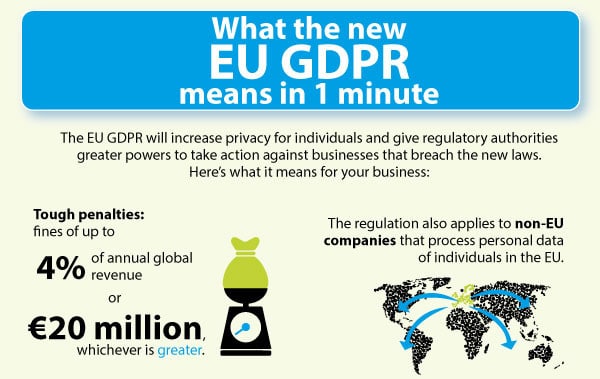As a data company, we cannot silently sit back in the shadows of one of the world’s biggest data protection regulations. This regulation is affecting everyone that is using an online platform the needs your data; from credit card information, your online activities and interests across all the multiple online platforms (e.g. email, social media, recruitment websites).
YouTube Videos: Top 5 things to consider for your GDPR preparation | GDPR explained in 2 minutes
The General Data Protection Regulation (GDPR) (EU) 2016/679 is a regulation in EU law on data protection and privacy for all individuals within and outside the European Union. The GDPR aims primarily to give control to “online citizens” over their personal data and to simplify the regulatory environment for international business; all foreign companies processing data of EU residents.
“The GDPR was adopted on 14 April 2016, and after a two-year transition period becomes enforceable on 25 May 2018”
The primary objective of GDPR is to regulate the simplified version of an online business environment, which leads to providing benefits to both public and businesses; from social platforms to financial institutions, online shopping, state authorities, and more (everything based on online personal data). Read More: General Data Protection Regulation https://en.wikipedia.org/wiki/General_Data_Protection_Regulation
This GDPR has some great positives and equally some great negatives, Challenges Associated With the GDPR
The decision to implement the GDPR has come with criticism. Those opposed to the new regulation say that the position of the DPOs could be an administrative burden for many EU countries. The guidelines were set to include social networks and cloud providers but did not consider how to deal with employee data. In addition, data cannot be transferred to another country outside the EU, unless it guarantees the same kind of protection.

Companies that didn’t have this kind of privacy protection may be required to change their business practices. The costs associated with the proposed regulation may also increase (due to the need for more investment) and general education in data protection may also be required. Data protection agencies across the EU will need to agree to a standard level of protection, something that may not be easy as they may disagree with the interpretation of the guidelines. Read more: General Data Protection Regulation (GDPR) Definition | Investopedia https://www.investopedia.com/terms/g/general-data-protection-regulation-gdpr.asp
